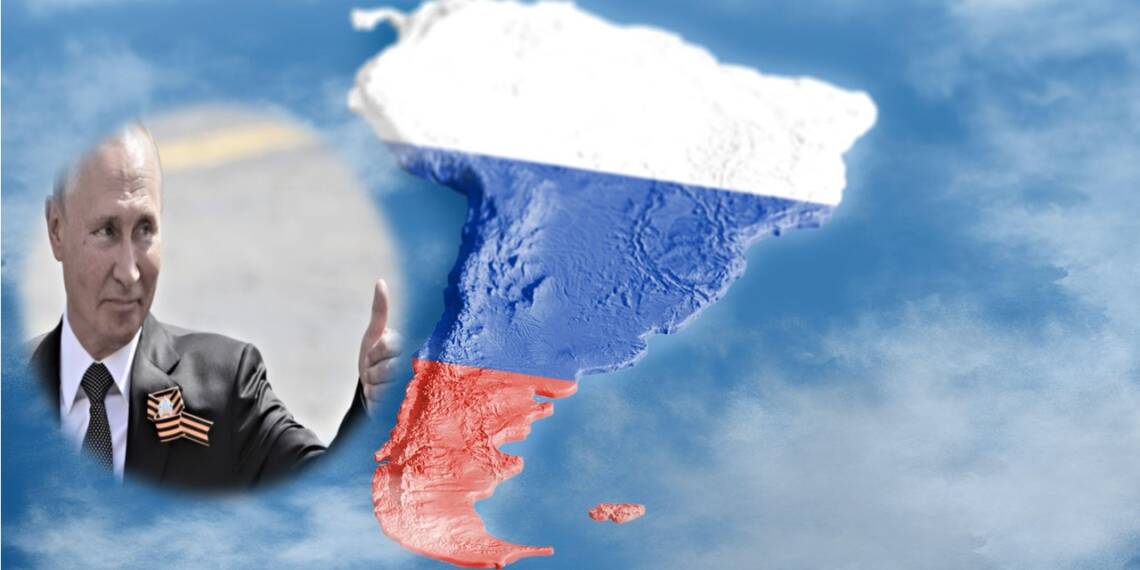In Latin America, the affection for Russia and particularly for Vladimir Putin is deeply rooted in the region’s historical context and geopolitical stance. This affection stems from Latin America’s longstanding skepticism toward Western actions, notably those of the United States, which have included interventions and coups in the region. The invasion of Iraq by the West, for example, has only served to heighten this skepticism. Putin, with his bold stance against what is perceived as Western Imperialism, resonates with many in Latin America who admire his fearlessness in challenging the West.
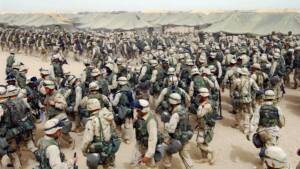
Moreover, Latin America’s identification with the Global South and its own history of colonization by Western powers create a natural affinity for Russia. The Cold War era, during which parts of Latin America were battlegrounds for the U.S., has left a lasting impression, making Russia’s opposition to Western hegemony appealing.
Join us on Telegram: https://t.me/tfiglobal
Despite the evolving global landscape, the United States has struggled to adjust its policy toward Latin America. Rather than treating Latin American nations as significant partners and leveraging the influence of regional powers like Brazil to promote democratic norms, the U.S. has often taken a paternalistic approach. This has led to a perception that the U.S. views Latin America as its “backyard,” without offering the respect and partnership that nations in the region seek.
This complex backdrop of historical, political, and social factors has led to widespread support for Putin and Russia in Latin America. The region’s leaders and its people see in Putin a figure who champions resistance against Western dominance, aligning with their desire for autonomy and respect on the global stage.
Vladimir Putin has significantly narrowed the distance between Latin America and Russia through a series of strategic, economic, and political maneuvers, fostering a relationship that benefits both parties on various fronts.
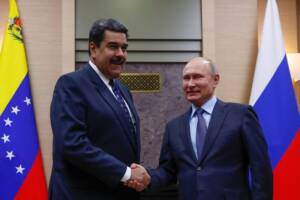
One of the most visible signs of Russia’s involvement in Latin America is its military cooperation with countries like Venezuela, along with the recruitment of Cubans.
Despite the current scale of trade between Latin America and Russia being relatively modest, there’s a noticeable ambition from both sides to expand these economic and military ties. Latin American countries view Putin as a pivotal figure who could potentially transform their economic landscapes and bring about financial prosperity.
Russia has also made significant inroads in building political support across Latin America. This is evident in its industrial expansion and partnerships, particularly with nations like Cuba, where Russia has extended financial aid and even gone as far as cancelling debts.
Read More: Tucker’s Interview of Putin: How Putin Justified his actions in Ukraine with historical context
The distribution of Russia’s Sputnik vaccine played a pivotal role in cementing its relationship with Latin American countries during the COVID-19 pandemic. Offering a cheaper and more accessible vaccine option, Russia was able to step in as a crucial partner to countries like Argentina, demonstrating its commitment to public health in the region.
Furthermore, the BRICS group, which includes Russia and recently welcomed Argentina as a member, serves as an attractive alternative for Latin American countries looking to diversify their international alignments away from traditional Western-centric models.
Through these varied approaches—ranging from military cooperation and economic ties to health diplomacy and political partnerships—Putin has skillfully brought Latin America closer to Russia, creating a multifaceted relationship that holds promise for both regions.
The diplomatic tour of Sergey Lavrov, Russia’s Foreign Minister, through Latin America in 2023 played a pivotal role in sustaining and nurturing the bond between Russia and several Latin American countries. Lavrov’s journey across Brazil, Venezuela, Nicaragua, and Cuba was not just a routine visit; it was a strategic move aimed at reinforcing Moscow’s alliances within the region and advocating for a world order that is multipolar.
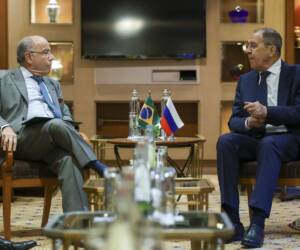
During his visits, Lavrov focused on bolstering the ties between Russia and these nations, openly condemning the U.S. sanctions imposed on them. His message was clear: Russia respects the sovereignty of Latin American countries and is eager to deepen economic cooperation across various sectors, including agriculture, nuclear power, and pharmaceuticals.
Lavrov skillfully used the Ukraine conflict as a backdrop to argue against the binary choice of aligning with either Russia or the U.S., attempting to drive a wedge between the U.S. and its Latin American allies.
Read More: Tucker drops Bombshell hints about his upcoming interview with Putin
A key moment of the tour was Lavrov’s stop in Brazil, where discussions potentially touched on mediation in the Ukraine conflict, with President Lula expressing interest.
The overarching goal of Russia’s engagement in Latin America, as emphasized by Lavrov’s tour, was to foster the creation of new supply chains and support the region’s emergence as a central player in a multipolar world.
Lavrov’s visit also highlighted the ongoing economic and security cooperation between Russia and Latin American countries, including agreements on the peaceful use of atomic energy and participation in Russian forums.
Furthermore, the tour reflected a coordinated effort among BRICS countries to stand against Western attempts to isolate Russia. The discussions on circumventing geopolitical impacts and fostering economic collaboration underscore the strategic alliances that aim to challenge the existing global order and promote a more diversified and inclusive world system.
In the context of the Russia-Ukraine conflict, Latin America’s stance has been notably distinct from that of many Western nations. This divergence stems from a combination of historical, political, and economic factors that have shaped the region’s view on global conflicts and its approach to international diplomacy.
Brazil, a key player in the BRICS consortium, had opted for a mediation role in the conflict, reflecting its broader foreign policy of non-alignment and peaceful resolution of disputes. President Luiz Inácio Lula da Silva, alongside leaders from other countries like India and Indonesia, has been vocal in criticizing the United States’ military aid to Ukraine. This criticism aligns with a broader reluctance to vilify Russian President Vladimir Putin, indicating a preference for dialogue over condemnation.
The conflict is perceived by many in Latin America as a potential catalyst for a new Cold War, evoking memories of US-backed coups during the original Cold War era.
When it comes to the issue of territorial annexations by Russia in Ukraine, the response from Latin American countries has been relatively muted. Except for a few like Nicaragua, most Latin American nations refrained from joining Western sanctions against Russia.
Interestingly, the invasion of Ukraine did not significantly damage Putin’s image in Latin America. Major countries like Mexico and Brazil, while formally condemning the invasion, have continued their partnerships with Russia.
Venezuela’s Nicolas Maduro, among other Latin American leaders, attributed the conflict to provocations by NATO and the US.
Read More: Putin’s final warning to Zelensky
In a world increasingly defined by geopolitical tensions and alignments, Latin American leaders have shown a remarkable boldness in maintaining and strengthening their ties with Moscow, despite warnings from the United States.
Former Brazilian President Jair Bolsonaro’s visit to Russia highlighted a willingness to foster close relations with Vladimir Putin, illustrating a significant contrast to Brazil’s more cautious engagement with Western leaders.
Similarly, Argentina’s former President Alberto Fernández made a notable visit to Moscow, aiming to position Argentina as a conduit for Russian influence in Latin America. This strategic move was aimed at reducing Argentina’s economic dependence on the United States and the International Monetary Fund (IMF).
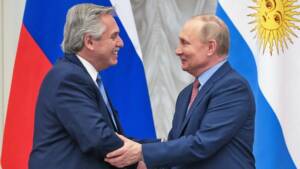
Venezuela’s engagement with Russia, especially in receiving military support and expertise, including military equipment and possibly hosting Russian troops for joint military exercises, underscores the depth of the partnership between these nations.
El Salvador, under President Nayib Bukele, has also shown interest in strengthening ties with Russia. The potential connections between Bukele’s Bitcoin policy and Russian-linked US libertarians suggest a complex web of interests and alignments that extend beyond traditional diplomatic relationships.
These developments indicate a significant shift in Latin America’s diplomatic and geopolitical strategies. By actively engaging with Russia, Latin American leaders are not just seeking to diversify their international relationships; they are also signaling a desire for a more multipolar world where regional powers have greater autonomy and influence.


